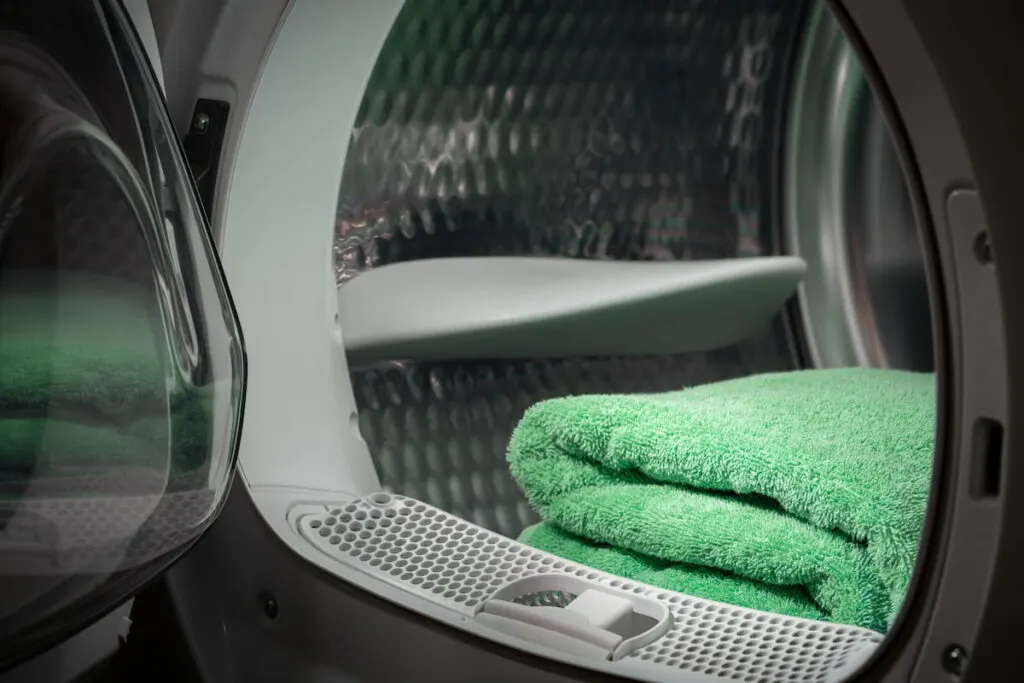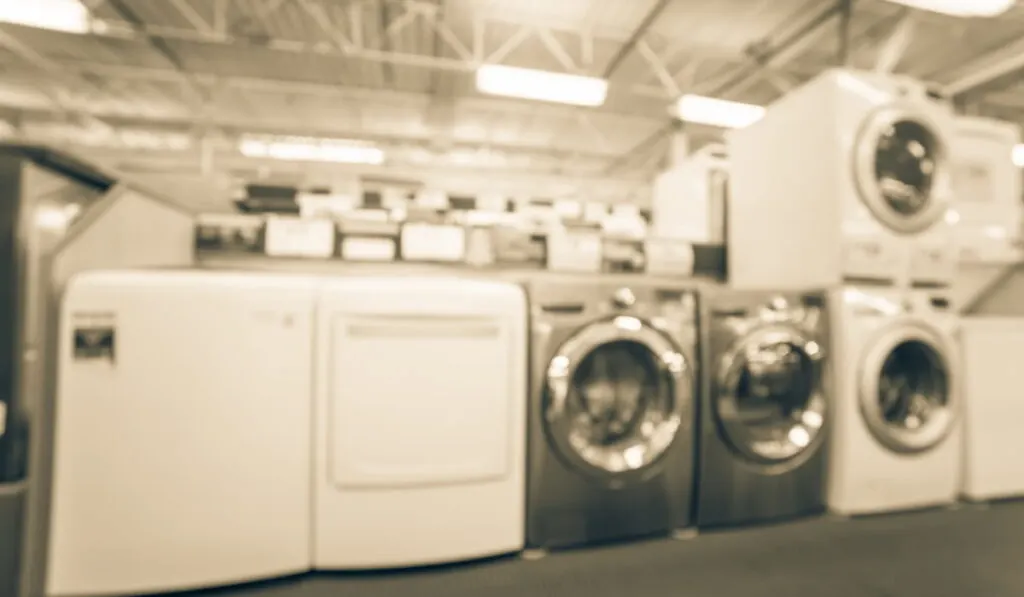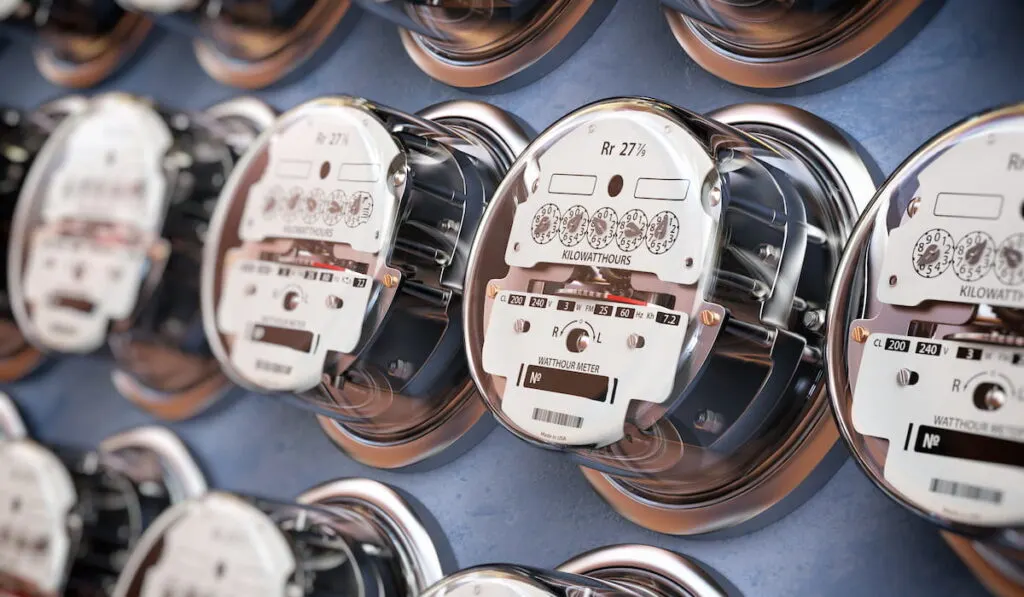*This post may have affiliate links, which means I may receive commissions if you choose to purchase through links I provide (at no extra cost to you). As an Amazon Associate, I earn from qualifying purchases. Please read my disclaimer for additional details.
Homeowners are becoming more cost-conscious this year. People want to know how much they’re spending and are looking for ways to reduce energy consumption at home.
One thing people are interested in is how much electricity their dryers use.
Dryers tend to be one of the most energy-intensive appliances in a typical household. This is because the dryer needs to generate a lot of heat to dry clothes, which takes a good deal of energy.

Understanding how much electricity your dryer uses can help you operate it more consciously or find ways to lower your electric bill.
Here’s some helpful information on dryers and how much energy they use.
Table of Contents
Gas Dryer Vs. Electric Dryer
For the most part, gas dryers are much more energy-efficient than electric dryers. So even with the recent hike in gas prices, it will still typically cost less to run a gas-powered dryer than an electric one.
Why? Because gas heats up faster, your gas dryer will dry your clothes in much less time. Usually, a gas dryer takes half as long to run through a normal cycle.

If you add up the 30 minutes of energy savings over the lifespan of your dryer, the savings can be truly impressive!
Large families and particularly cost-conscious people favor gas dryers because they know they’re saving money with each load.
If you’re doing laundry frequently, those cents add up quickly.
How Much Electricity Does a Dryer Use Per Load?
Approximately how much electricity does a dryer use per load?
The exact amount will vary on local electricity and gas prices, the age of your dryer, how well it works, and other factors.
However, let’s say your typical dryer cycle lasts between one and two hours with a normal load. An average dryer will cost around $0.30 to $0.50 per load.
If you do laundry every day of the month, you’re paying around $10-$15 per month to use your dryer.
An average load of laundry will use around three kWh (kWh = kilowatt hour; 1 kWh = 1000 watts).
So, all you need to do is look up the wattage on your dryer (for example, 3000 watts or 5000 watts) and multiply by how long it runs.
Does a Dryer Use More Electricity than a Washer?
In almost every case, your dryer will use much more energy than your washing machine. Your washing machine moves, but it’s not required to generate as much heat as a dryer.
Usually, your washing machine will draw its hot water from your water heater. It’s not making the hot water by itself.
On the other hand, your dryer has to create a great deal of hot air. That takes a lot more energy.

Is It Cheaper to Dry Your Clothes at Home or at the Laundry Mat?
On a per cycle basis, it’s much cheaper to dry your clothes at home in your appliance.
Not everyone has a dryer, though, so you also have to consider the cost of buying a dryer, whether it’s new or used.
When you factor in the cost of an appliance, you will have to use the dryer for years before you start saving money compared to washing clothes at a laundromat.
Of course, there are also other things to consider like:
- You could always sell your dryer
- There are other costs associated with laundromats like buying drinks, paying for detergent, the cost of running the building built into the price you’re charged per load, etc.
It’s hard to make a direct comparison between the two, but suffice it to say that, generally, using owned appliances at home is cheaper than paying someone else to use theirs.
Does a 3-Prong Dryer Use Less Electricity Than a 4-Prong Dryer?
In the early 1990s, a lot of dryers came with three-prong cords.
They worked well for the most part, but there was a small chance of electrocution from the three-prong power supply.
As a result, the government changed standards to say that all new 240-volt dryers must be fitted with four-prong cords, thereby reducing the risk of electrical hazards.
When it comes to how much energy each uses, there is very little difference between the two.
If you still have a three-pronged cord and a 240-volt dryer, you need to change it to comply with existing codes.
It’s something to note for people who are buying homes with older appliances in them.
3 Ways to Monitor Dryer Electricity Usage
Tracking exactly how much electricity your dryer is using can be a challenge. There are, however, ways you can get an idea of how much juice your appliance is using. Here’s how:
Track Your Meter Before & After a Load
One nice trick you can try is checking your electric gauge before you put in a load and checking to see what it is after the load is complete.
To get a more accurate reading, you should turn off the lights in the house and do your best not to use electricity from any other sources.
If you want to get extreme, you’ll need to unplug the refrigerator, though consumption will likely be negligible.
Just using the dryer and not running another appliance should give you a rough estimate of how much electricity you’re using.

Buy a Usage Monitor
If you look on Amazon , you can find electricity usage monitors that go between your wall socket and the dryer plug.
The meter reads how much electricity passes from the socket to the cord to give you an accurate reading of how much power it uses.
You need to make sure you find the right size and voltage to guarantee it will work.
Calculate Energy Usage by Hand
If you know the wattage of your dryer, then you should be able to calculate how much energy you’re using with some basic math.
Just multiply the wattage by how much time you use the dryer to get the final kWh reading.
Then, if you know your local electricity rates, you can multiply your kilowatts per hour by the cost per kWh.
Conclusion
A clothes dryer does use a lot of electricity because of the amount of heat it needs to produce in order to dry your clothes. A lot of laundry expends a lot of energy.
You can, however, monitor this usage and use your findings to cut costs if that’s your goal.
Resources
- https://www.thespruce.com/how-much-does-it-cost-to-run-an-electric-dryer-1387954
- https://www.inspirecleanenergy.com/blog/sustainable-living/how-much-electricity-dryer
- https://www.houzz.com/discussions/5182498/measuring-electrical-usage-on-dryer
- https://theenergyprofessor.com/gas-dryer-vs-electric-dryer/#Which_is_More_Efficient_Gas_vs_Electric
